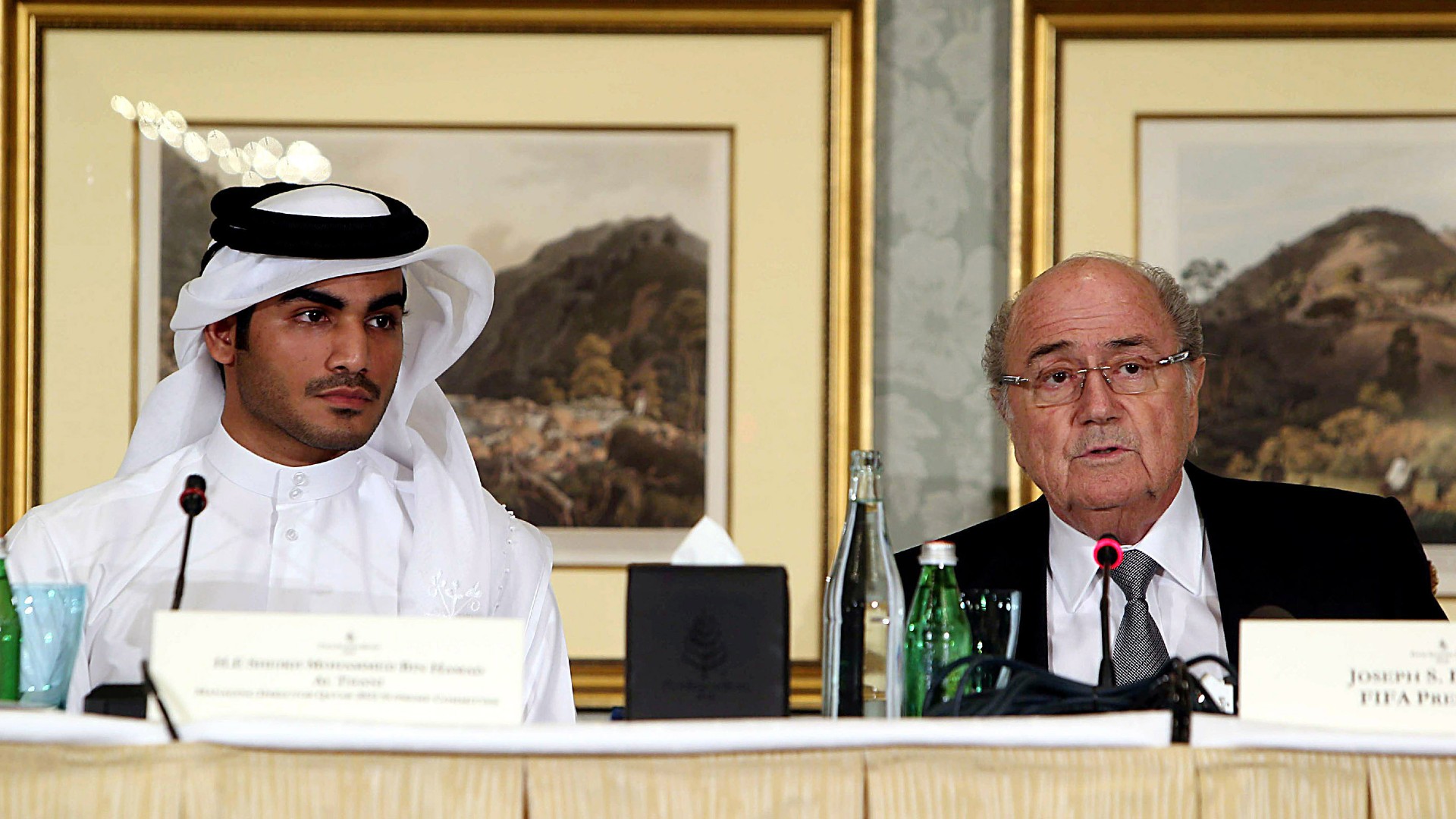With less than a year to go before the start of the 2022 FIFA World Cup, questions surrounding host nation Qatar’s handling of humanitarian issues show few signs of abating – specifically concerning the state’s anti-homosexuality laws.
Nasser Al Khater, the chief executive of the tournament’s organising committee, insists that Qatar has been treated “unfairly and unjustly” since it earned the right to host the tournament 11 years ago.
“We know that the World Cup brings with it a certain amount of scrutiny. We’ve seen it in the past,” Al Khater told CNN Sport’s Amanda Davies. “But if it’s something that’s going to be [a] catalyst for change, we’re all for it.”
READ MORE: Brandon Smith issues statement in the face of criticism over podcast
READ MORE: Ronaldo outburst overshadows Messi’s seventh Ballon d’Or
READ MORE: Fighters lining up for George Kambosos Jr
Among the most recent critics of next year’s World Cup, the first to be held in the Middle East, is Australian footballer Josh Cavallo, the only current, openly gay player in men’s top-flight football.
Earlier this month, Cavallo said that he would be “scared” to play in Qatar, where homosexuality is illegal and punishable by up to three years in prison.
In response to Cavallo’s fears, Al Khater said: “On the contrary, we welcome him here in the state of Qatar, we welcome him to come and see even before the World Cup … Nobody feels threatened here, nobody feels unsafe.”
He added: “The notion that people don’t feel safe here is untrue. I’ve said this before and I say this to you again, everybody is welcome here. Everybody is welcome here and everybody will feel safe here. Qatar is a tolerant country. It’s a welcoming country. It’s a hospitable country.”

In October, Welsh football fan James Brinning told CNN Sport that he “wouldn’t feel safe” travelling to Qatar if Wales qualified for the World Cup due to his sexuality.
“That’s really upsetting to think about because I should be able to be a part of such a huge moment in Welsh football history if it happens,” he said.
This is not the first time that anti-LGBTQ laws have been a concern around a major football tournament.
In June, European football governing body UEFA declined a request to light up Munich’s Allianz Arena in rainbow colours for the Euro 2020 match between Germany and Hungary following an anti-LGBTQ law passed by Hungary’s parliament.
Then ahead of the 2018 World Cup, the UK Foreign Office warned before the tournament that members of the LGBTQ community face “significant risk” in travelling to Russia.
And football is not the only sporting community to raise concerns about Qatar’s anti-homosexuality laws. Ahead of Formula One’s Qatar Grand Prix on November 21, Lewis Hamilton, who would go on to win the race, was widely praised for wearing a helmet featuring the Pride Progress Flag – a redesigned and more inclusive version of the traditional rainbow flag – which was emblazoned with the words “We Stand Together.”
Al Khater acknowledged that Qatar does have a stricter approach towards public displays of affection compared to other countries, and when pressed by CNN on the country’s laws, Al Khater declined to say that homosexuality is illegal, saying only that “like many countries,” same-sex marriage is illegal in Qatar.
“In different countries, there is more leniency to public displays of affection,” he said.
“Qatar and the region are a lot more modest, and Qatar and the region are a lot more conservative. And this is what we ask fans to respect. And we’re sure that fans will respect that … We respect different cultures and we expect other cultures to respect ours.”
Over the past decade, Qatar has also been under pressure regarding its treatment of migrant workers involved in constructing World Cup stadiums, with the International Labour Organisation (ILO) recently saying that the state is inadequately investigating and reporting workplace deaths.
Earlier this year, Barun Ghimire, a human rights lawyer based in Kathmandu whose work focuses on the exploitation of Nepalese migrants working abroad, told CNN that the plight of Nepalese labour workers is “particularly grievous in the Gulf.”
“Migrant workers from the poorest of countries go to Qatar seeking employment,” he said, adding: “The Qatar World Cup is really the bloody cup – the blood of migrant workers.”
Ghimire stressed, though, that blame shouldn’t only be laid on Qatar. He said that the Nepalese government and other countries should also be held accountable for not providing workers with proper protection in their destination countries.
In a report released this month, the ILO said that at least 50 of Qatar’s workers died in 2020 as gaps in data collection by the country’s institutions impeded the organisation from presenting a categorical figure on the number of fatal occupational injuries.
In a statement, Qatar’s Ministry of Labour said that “figures reported in media on migrant worker fatalities have been wildly misleading,” while Al Khater also refuted that there are gaps in Qatar’s reporting of working deaths.
“Our worksites are clear … They have contractors, they have worker welfare teams on site,” he said. “If there was a fatality, everybody would know about it. It’s not something you can hide.”
The Guardian reported earlier this year that 6,500 migrant workers have died in the country since Qatar won its bid to host the World Cup in 2010, most of whom were involved in low-wage, dangerous labour, often undertaken in extreme heat.
The report, which CNN has not independently verified, did not connect all 6,500 deaths with World Cup infrastructure projects.
Al Khater reiterated that he refutes the accuracy of the report, saying: “I categorically deny The Guardian statements.”
He added: “This is something that needs to be made absolutely clear. Absolutely clear. The number of fatalities on World Cup stadiums that are related to work are three fatalities. There are just over 30 fatalities that are non-work-related.”
The past few years have seen Qatar implement policies to reform its labour structure.
The state’s sponsorship system, known as the kafala, was dismantled last year, in part allowing migrant workers to change jobs before the end of their contracts without requiring consent from their employers.
Qatar has also introduced a non-discriminatory minimum wage of $275 per month that applies to both migrant labour workers as well as domestic workers – a policy it claims is the first of its kind in the region.
“The progress that’s been made over the 10 previous years by the state of Qatar is not comparable to any progress that’s been made anywhere around the world in such a short time frame,” said Al Khater.
“Enacting legislation usually takes a very long time. It has been put through very quickly in the state of Qatar. They’ve been put on fast track to make sure that they’re implemented.”
Several national teams, including Denmark, Germany and Norway, have already spotlighted human rights issues ahead of the World Cup.

Denmark is the latest to do so after announcing that two kit sponsors will give up branding space on the players’ training kit in place of messages highlighting human rights issues in Qatar. The country’s football union has also said that it will minimise the number of trips to Qatar to avoid promoting events around the World Cup.
Player protests are likely to continue in the buildup to – and during – next year’s tournament, which Al Khater said organisers will not stop from taking place.
“Are we worried about it? No, I wouldn’t say we’re worried about it,” said Al Khater.
“But I think there’s a responsibility on these players and there’s a responsibility on these federations to make sure that when people are taking positions, they’re taking [a] position that is accurate and reflect reality.
“Because regardless of what people feel are facts, people also need to recognise progress, they need to recognize the responsibility that the state of Qatar has taken on its shoulder to progress, to enact laws, to protect worker’s rights, their welfare.”
Tuesday marks the start of the Arab Cup involving 16 teams from across the region. It will also see two World Cup venues – Al Bayt Stadium and Ras Abu Aboud Stadium – inaugurated on the tournament’s opening day.
For the Qatar 2022 organising committee, it provides a chance to trial some of the World Cup venues in advance of next year’s competition.
“It’s going to be a big test and it’s going to be a very useful test,” says Al Khater.
Next year’s tournament, however, will be on a different scale to the Arab Cup, with more teams, more fans and more eyes watching around the world.
In the meantime, 13 countries have now qualified for the tournament as the protracted countdown for Qatar 2022 rolls on.
For a daily dose of the best of the breaking news and exclusive content from Wide World of Sports, subscribe to our newsletter by clicking here!

